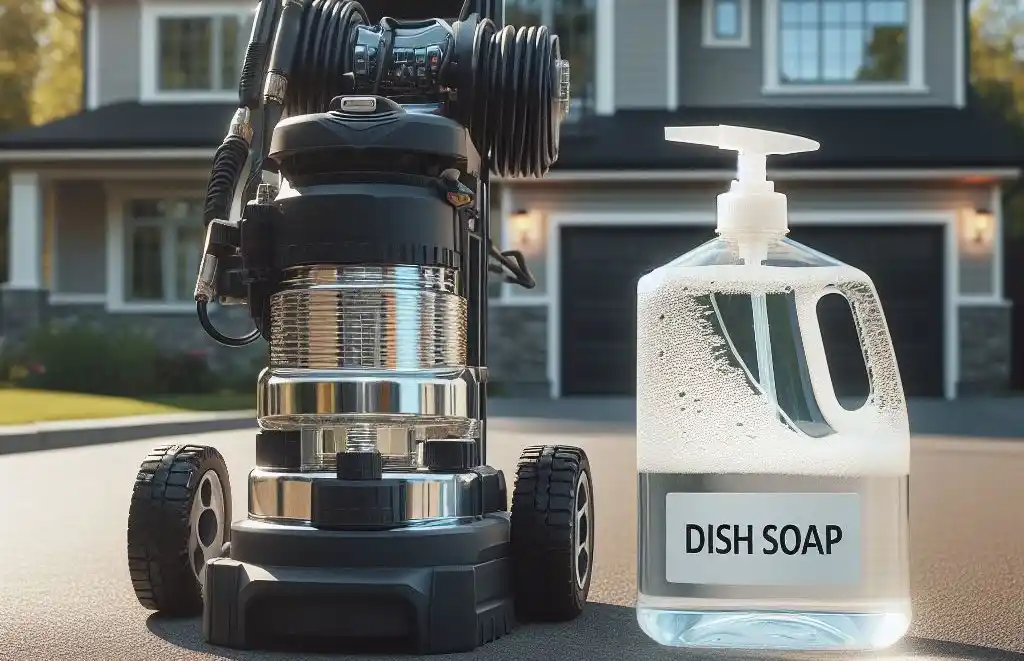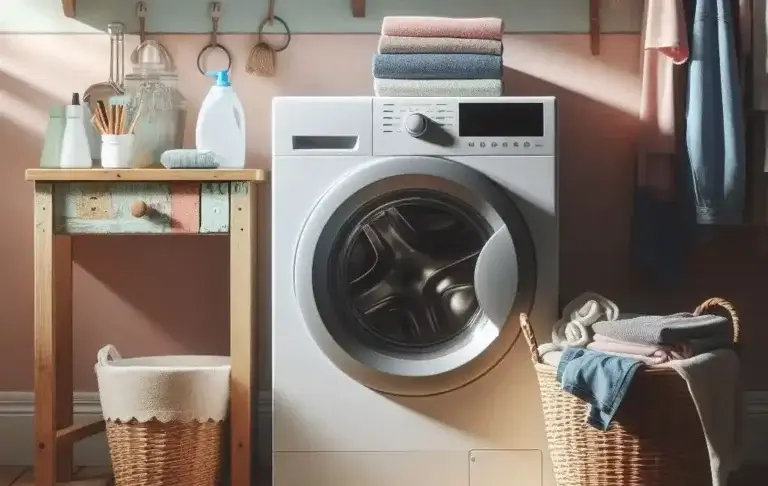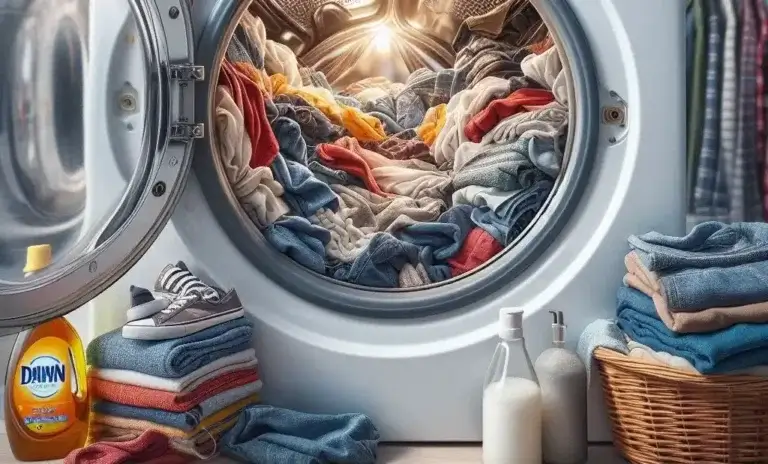Can You Put Dish Soap in a Pressure Washer? A Big No, Find Reason Here!
Are you wondering if you can use dish soap in a pressure washer to help clean surfaces more effectively? Using the right soap and detergent is crucial for safe and effective pressure washing.
Putting the wrong substances like dish soap in a pressure washer can potentially damage the machine and won’t clean as well. This article will cover everything you need to know about Can You Put Dish Soap in a Pressure Washer?
Table of Contents
Introduction to Using Soap and Detergents With Pressure Washers
Pressure washers are powerful cleaning tools that use high-pressure water to remove dirt, debris, stains, and more from various surfaces like concrete, siding, decks, vehicles, and equipment.
The high pressure applied allows the water to penetrate and dislodge buildup very effectively. Detergents and soap solutions are often used along with pressure washers to help break down oil, grease, and heavy stains.
Benefits of Adding Detergent:
- Improves cleaning ability for heavy grime and stains
- Clings to and penetrates surfaces longer than water alone
- Helps lift and rinse away dirt and debris
Many pressure washers have onboard detergent tanks and soap nozzles designed specifically for applying the right soap solutions. Choosing the appropriate detergent or soap is crucial for not damaging pressure washer parts and providing optimal cleaning.
Can You Put Dish Soap in a Pressure Washer?
Dish soap like Dawn or other similar cleaning detergents may seem like reasonable solutions for helping clean with a pressure washer since they can cut through grease. However, dish soap should not be used in pressure washing equipment.
Reasons to Avoid Using Dish Soap:
- Can Damage Internals – The chemicals and ingredients in dish soap are too harsh for pressure washer pumps and components. Using dish soap could damage valves, seals, and o-rings over time.
- Excess Foaming – Dish detergent creates thick foaming suds which most pressure washers aren’t designed to handle internally. Excess sudsing can clog components or leave a residue.
- Not Designed For Pressure Washing – While dish soap works well for hand washing dishes, it’s not formulated for pressure cleaning use. The cleaning agents aren’t ideally balanced.
Look for pressure washer detergents that are specifically designed for high-pressure wash systems. Specialized cleaning concentrates contain a careful mix of low-sudsing cleaning agents, surfactants, emulsifiers, and ingredients safe on pressure washer parts.
In a properly formulated pressure-washing detergent solution – the ingredients lift stains while the water provides the rinsing action. With dish soap high levels of foaming suds reduce the effectiveness of the pressure rinse while increasing the chances of damage in the washer system.
Signs of Damage From Using Dish Soap in Pressure Washer
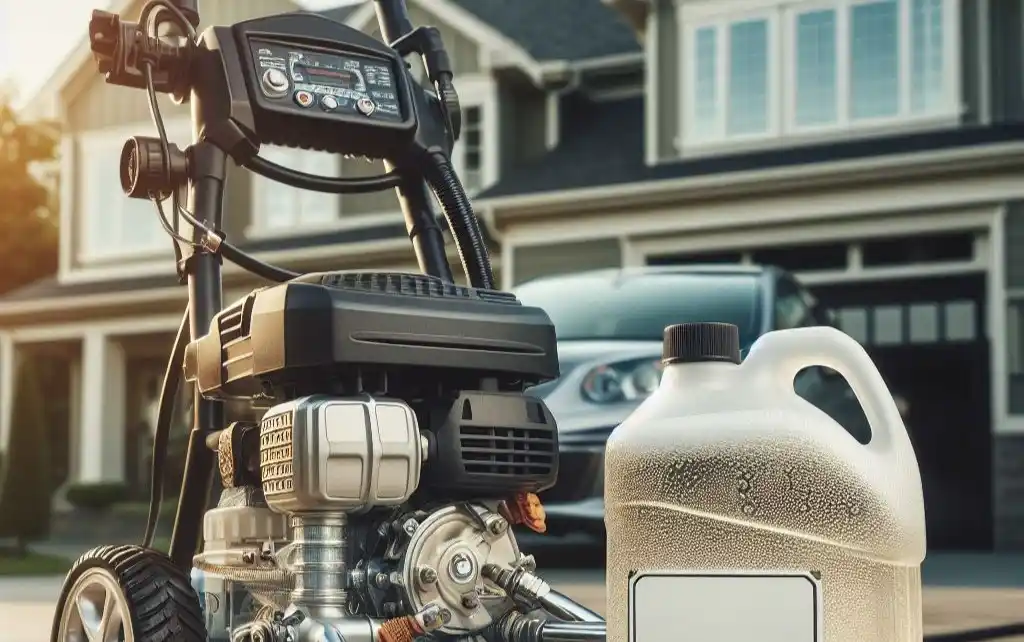
If you’ve already used dish soap like Dawn in your pressure washer there are some signs of damage you may notice over time including:
- Loss of pressure washing power
- External leaking around seals and fittings
- Soap leaking from the pump or detergent compartment
- Black liquid dripping from the equipment
- Increased cavitation (noise) from the pump
- Fails to build normal operating pressure
The internal valves, plunger cups, seals, and o-rings will gradually erode from contact with caustic dish detergents. This damage reduces performance and can lead to pressure washer breakdowns over time. Stop using dish soap right away if you notice any issues.
While some immediate effects are noticeable, other harsh soap effects accumulate more slowly – shortening the normal lifespan of your power washer. It’s best not to cut corners using the wrong detergents.
What Kind of Soap Should You Use?
For safe pressure washing always use detergents specifically designed for power washers. Look for the following features on pressure washer detergent solutions:
- Low-Foaming Formula – Creates minimal suds designed for pressure rinse systems.
- Special Surfactants – Penetrates and lifts grease/grime faster than dish soap.
- Water Softening Agents – Prevents mineral spots and streaking.
- Safe For Pressure Washers – Gentle on o-rings, seals, hoses, and parts.
Types of Pressure Washer Cleaning Solutions:
- General Purpose Cleaners
- Degreasers
- Vehicle/Fleet Wash
- Concrete Cleaners
- Wood and Deck Cleaners
- House Wash Mixes
The right choice depends on your specific pressure washing application. Many popular pressure washer brands like Powerfit, Clean-Xpert, and MTM Hydro offer cleaning concentrates designed specifically for pressure wash systems.
Using the correctly matched soap helps improve cleaning results without the risk of corrosion inside the equipment. Check your pressure washer manual for any detergent recommendations too.
Can You Use Laundry Detergent in a Pressure Washer?
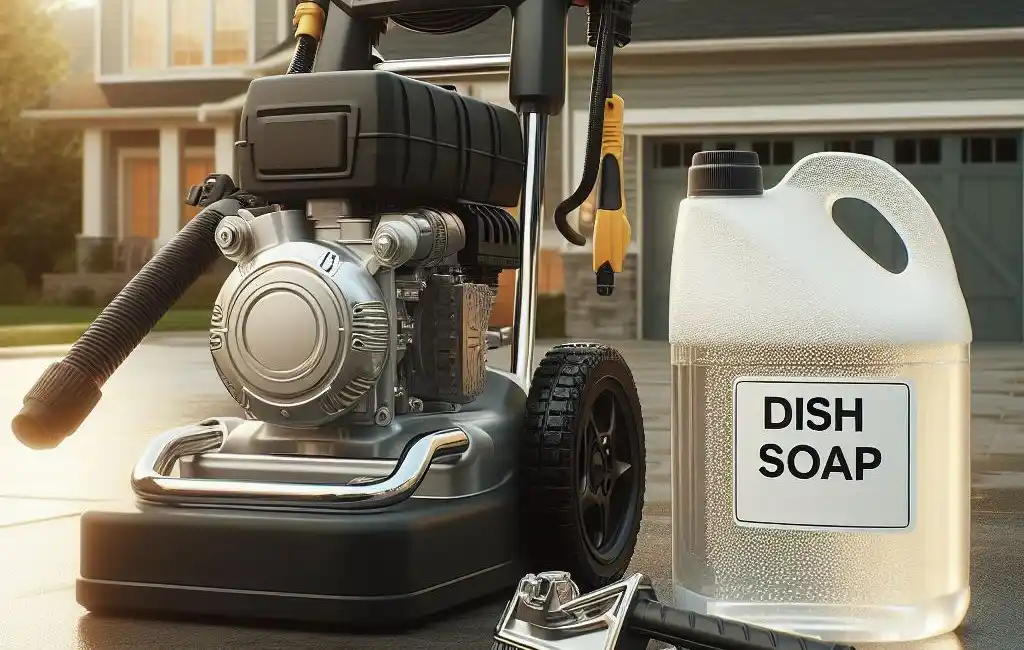
Laundry detergents like Tide or Gain aren’t suitable for pressure washers either and can cause the same internal damage as dish soaps. The sudsing levels are still too high for most pressure wash systems.
However, there are some alkaline laundry detergents containing Sodium Hydrochloride marketed for commercial pressure washing applications.
Examples of commercial alkaline detergents include:
- TryClean – Commercial Pressure Washer Detergent
- Pro Kleen Breakthrough 900
While these are sometimes used commercially, laundry detergents are still not recommended by most residential pressure washer manufacturers. Stick to pressure washer-specific cleaning solutions only.
How to Add and Use Pressure Washer Detergent
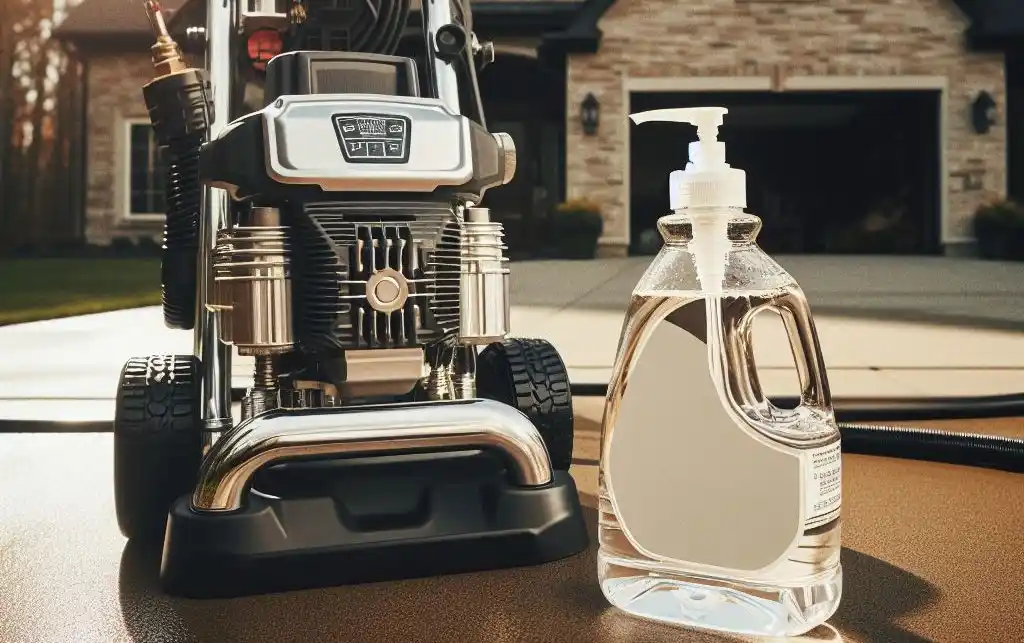
If your pressure washer has an onboard soap tank you can conveniently inject and apply detergents. Units without built-in tanks require manually mixing the solution in a bucket or garden sprayer and using a soap nozzle to apply the mix.
Follow the steps below for successfully adding and rinsing with pressure washer detergents:
1. Check Equipment Instructions
Review your owner’s manual for specific guidelines on volume capacities, approved cleaning solutions, and best practices for introducing soap.
2. Fill Onboard Detergent Tank (If Equipped)
With the pressure washer turned off, unscrew the detergent tank cap and measure the recommended amount of concentrated cleaner. Replace the cap and tighten it.
3. Install Soap Nozzle Tip
Attach the special soap nozzle to the spray wand designed for detergent application at low pressure. Remove the other nozzles first.
4. Apply Detergent To Surface
Trigger the soap nozzle to spray diluted detergent directly onto the surface starting from the bottom up. Allow to soak briefly. Apply liberally on heavily stained areas.
5. Let Soak In Briefly
Allow 3-5 minutes of dwell time for the detergent to penetrate and lift grime from the surface before rinsing. Reapply if needed.
6. Rinse Away Residue
Rinse at high pressure in a long sweeping motion. Overlap passes until cleaned. Check effectiveness and reapply more soap solution to heavily stained areas if needed.
Repeat the detergent application steps as needed for heavy cleaning tasks. Avoid letting solutions dry on to prevent streaking. Proper rinsing is key to achieving spot-free results.
Pressure Washer Soap Amounts, Dilution Ratios and Guidelines
Follow manufacturer-advised dilution rates when mixing pressure washer detergents. Using too much or too little soap can affect cleaning performance.
Typical dilution ratios fall between:
- 3-8 ounces (up to 3%) per 1 gallon of water
- 1/3 to 1 1/4 cups (up to 10%) per 5 gallons of water
More tips on solution amounts:
- Start with less soap concentrate for lighter cleaning jobs
- Use max solution strength on extremely dirty or stained areas
- Only fill the detergent reservoir with enough soap for the job at hand
- Don’t allow solutions to sit stagnant between uses
- Flush systems thoroughly after each use
Carefully follow all guidelines for your pressure washer model including:
- Suggested detergent dilution percentages
- Approved cleaning solutions
- Maximum water temperature ratings
- Feed rate and flow limits
- Hose length restrictions
Deviation outside pressure washer directives can negatively impact performance, speed up wear-and-tear, and void equipment warranties – so it’s critical to follow standards.
FAQ – Common Pressure Washer and Detergent Questions
For more details on successfully using pressure washers with detergents check out answers to these frequently asked questions:
What is the best pressure washer soap and detergent?
The best pressure washer detergent depends on your specific cleaning application and washing surface. Quality brands like Powerfit, MTM Hydro, Clean-Xpert Pressure Wash Solutions, and Simple Green make cleaners for various pressure washing jobs.
What can I use if I don’t have pressure washer detergent on hand?
If you don’t have the ideal pressure washer detergents on hand, use a mild dish soap sparingly to spot-treat small areas only. Dilute soap concentrations substantially and limit use to avoid equipment damage. Always flush thoroughly afterward. Professional detergents are strongly advised whenever possible.
How often should you add soap to a pressure washer?
Most light residential washing tasks only require detergent application once per area. Heavily soiled surfaces may need additional detergent to lift all the grime. Let the detergent soak briefly before rinsing then reapply as needed. Take care not to the let solutions dry on.
What temperature should pressure washer soap be applied?
Follow manufacturer specifications for solution temperatures. Most pressure washer detergents are effective from ambient temperatures up to 120-140°F. Excess heat can break down cleaning properties. Some models don’t allow for hot water feeding when the soap nozzle is activated.
Can soap damage a pressure washer?
Yes, the wrong soap products containing harsh caustics or acids can erode internal valves and seals over a short time. Excessive heat also accelerates the deterioration of components from cleaning agents. Even properly diluted mild soap solutions take a minor toll for a long time. Proper care and maintenance is key for longevity.
Should pressure washer soap be applied to a dry or wet surface?
It’s generally best to pre-wet the area first with water only, then apply detergent solutions to a damp wash area. Detergents adhere and penetrate better on a wetted surface allowing chemicals to work more efficiently.
How to properly rinse after using pressure washer detergent
Carefully rinse detergent residues immediately after application before solutions dry on the surface. Rinsing prevents streaking or spotting. Wipe up puddles of excess fluids. Work top to bottom methodically covering all treated areas. Let the high-pressure rinse water do the work of flushing away grime.
Main Takeaways: Can You Use Dish Soap in a Pressure Washer?
While it may seem logical to add dish soap into pressure washers to boost cleaning strength, detergents like Dawn should be avoided for most residential power washing purposes. Stick to detergents specifically designed for pressure wash systems for optimal safety and performance.
Key things to remember about using soap in pressure washers:
- Dish soap & laundry detergents can damage pressure washers
- Use low-sudsing cleaners made for pressure washers only
- Follow all equipment guidelines for soap dilutions and temps
- Apply soap to pre-wetted surfaces and let soak briefly
- Completely rinse detergents immediately after, avoid letting them dry on surfaces
- Add soap slowly and use minimal amounts needed depending on grime levels
- Don’t void equipment warranty – carefully follow pressure washer manuals
Using the right detergents for your model along with smart practices keeps pressure washers performing safely for years extending their service lifetime!

